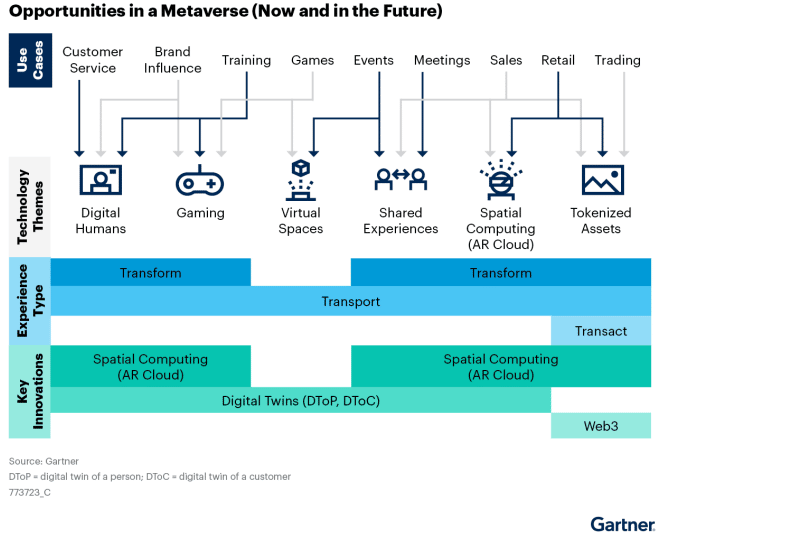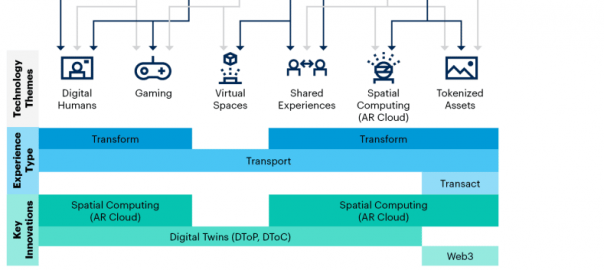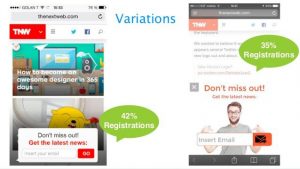As the metaverse hype cycle wanes, marketers will target specific technologies that add value to their plans and strategies.
The metaverse talk over the last year unlocked the creativity of marketers to imagine how they will engage customers in the digital, virtual future. In the year to come, many of these ideas will be viable, depending on the maturity of platforms and the lengths to which marketers will go to meet customers where they are.
It isn’t just talk. Big brands like Samsung, Under Armour and Walmart have rolled out multi-pronged, long-term engagements in virtual worlds and with virtual goods. Metaverse-related activations are in about half of marketers’ immediate plans, or they’re being considered.
Here’s the shape some of those plans will take in the year ahead.
Return to marketing basics
Virtual worlds and augmented reality experiences have the potential to reach customers in fresh, immersive ways. Marketers will focus on VR and AR experiences, and, following recent crypto-crashes, will likely hold off on NFT activations tied up in cryptocurrency value.
“I think there’s definitely a sense of a reality check on the crypto side of the metaverse,” said Andrew Frank, VP distinguished analyst at Gartner. “I think we’re going to see marketing organizations get much more practical and realistic about the value of these technologies. They’ll be looking at how they can use these technologies to enhance loyalties and more secure rewards currencies.”
This “return to marketing basics” means that marketers will stick with long-running loyalty and data strategies that can be enhanced with the new technology. For instance, NFTs and other digital tokens can provide discounts, like a coupon, without getting confused with investments in cryptocurrency.
“You can have [brand] advocacy without getting involved in this whole value of crypto as an investment vehicle,” said Frank.
“Another application of NFTs is the idea that you can selectively disclose your interest and intentions to a marketer,” Frank added. “Instead of collecting permission, you can use that [blockchain-based] loyalty card to express interest in products and general preferences.”
NFTs in loyalty programs
“The recent FTX collapse has sparked a lot of uncertainty and fear within the crypto/NFT market, but despite this situation, we are still seeing a lot of interest from brands to launch web3 activations,” said Laura Connell, consumer trends manager for consumer insights and analytics company GWI. “Because the metaverse’s focus is on community, brands will find different and new ways for consumers to digitally interact with them and each other.”
For instance, web3 users can acquire an NFT that unlocks certain privileges, just like traditional rewards programs. Because the NFT is supported by a decentralized blockchain ledger, the data relating to the customer’s engagement isn’t a private asset that a company or third party retains. It’s on the blockchain, not in a company’s database.
“We can expect to see brands begin to engage with NFTs more as they bake these digital activations in their loyalty and reward programs,” said Connell. “As we already see with Nike, Swoosh and Starbucks, rewarding engaged community members is the new era of brand marketing and customer retention.”
She added, “Within web3, we see NFTs as a brand loyalty program that could identify and curate a closer group of consumers than ever before.”
Discovering social cues and interactions
Virtual worlds and tokens are new for consumers and marketers alike. As brands get bolder and the space matures, they’ll be learning more about how users interact in this new environment.
“We’re starting to see ‘metaverse budgets,’ RFPs and internal ‘metaverse teams’ as companies formally commit to the metaverse beyond simply ‘testing the waters.’” said Alex Howland, President and cofounder of virtual world platform Virbela. “These innovators will discover more about the social cues that allow for complex interactions and how that can scale far beyond anything video conferencing accommodates.”
“A robust ecosystem of varied social environments will be an exciting exploration for companies in the metaverse in 2023,” said Sheldon Brown, cofounder and VP of product design and innovation for Virbella. “[These environments are] mirroring how we move between our real-world environments and emphasizing aspects of ourselves in different ways, in different contexts.”

The rise of gaming influencers
As marketers in gaming already know, the gaming ecosphere has its own rising stars. Look for more brands to tap into these thriving communities in the year ahead.
“[This] will be the year that marketers embrace partnerships with gaming influencers, even if no obvious direct ties to the gaming community exist,” said Alexander Frolov, cofounder and CEO of influencer marketing platform HypeAuditor. “While the gamers’ main platform might be Twitch or a similar streaming service, they often have a following on other social media platforms, such as Instagram and YouTube. For instance, Samsung, Red Bull, and even Hershey are some of the brands who already have partnerships with Ninja, the most followed gaming streamer on Twitch. We expect to see a surplus of non-gaming brands following in their wake.”
The post 2023 predictions: How marketers will approach web3, virtual experiences and gaming this year appeared first on MarTech.
(26)
Report Post









